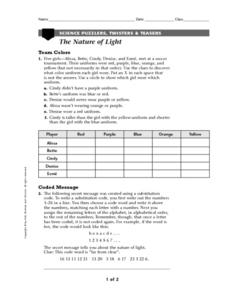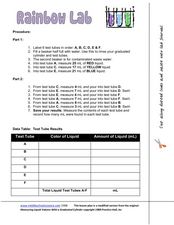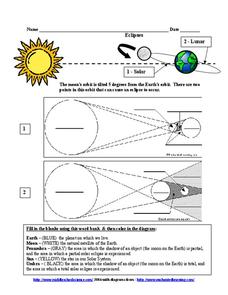Curated OER
A Horse of a Different Color
Elementary schoolers explore the wide variety of horse coat colors and reproduce an existing color as well a create their own horse coat color. There are two fine worksheets embedded in this plan that learners use to crete these coat...
Curated OER
Take-Home Midterm Exam #3, Part A
Let your physics learners take this electromagnetic radiation exam home to show what they know. You could also use it in class or assign it as a review. The content covers concepts pertaining to color, wavelength, frequency,...
Curated OER
Kindergarten-sight Words Fall Colors
Learners listen to the poem Fall Colors and find their favorite Fall color. In this Fall color lesson, students recognize the Fall color words. Learners make leaf prints with their favorite colors. Students talk about their...
Curated OER
Hair and Eye Color
In this human biology interactive worksheet, students identify the color of hair and eyes in each illustration by choosing the appropriate color from the drop down menu. There are four questions to complete, as well as a crossword puzzle.
Curated OER
Color
In this color worksheet, students read where light comes from and the different colors created through a prism. Students compare light (additive color) with pigments (subtractive color). Then students complete 1 drawing, 6 matching, 22...
Curated OER
Shrinky Dinks® Palettes
Here is a fun and clever lesson for teaching physics classes how to calculate wavelength if given the energy and frequency data. On a worksheet, they compute wavelengths using a table of information that you provide. On a paper palette,...
Curated OER
Red Leaf, Yellow Leaf
Students discuss the differences between a storybook and an information book. Students use various materials found in nature to make a nature collage. Students make a nature dictionary using pictures and their own definitions from the...
Curated OER
DNA Coloring - Transcription and Translation
In this DNA worksheet, pupils review the transcription and translation processes. Students label and color the different parts of a DNA strand. This worksheet has 7 fill in the blank questions.
Curated OER
How Do The Colors of Light Mix?
Students investigate the mixing of light. They form a hypotheses to reason why color changes occur and they write conclusions and ask new questions arising from the investigation. Students identify the primary and complementary colors of...
Curated OER
What's Your Color?
In this animal camouflage learning exercise, learners study 8 color names. They are asked to write an animal that would use this color as an adaptation. Students need to describe how this would help the animal.
Curated OER
Starlight, Star Heat
In this stars worksheet, students read how astronomers calculate the temperature of a star by measuring its color. Students use a chart showing star temperatures and colors to complete 3 short answer questions.
Curated OER
Planting a Rainbow Bulletin Board
Students explore a variety of colors and shapes after reading the story, "Planting A Rainbow," by Lois Ehlert. The tracking and reading of labels attached to diagrams form an experience in vocabulary development in this lesson.
Curated OER
Plant Parts
Little ones identify the parts of a plant and practice following directions at the same time. They color each part of the flowering plant the color indicated on the sheet. Roots are brown, leaves are green, the flower is red, and the...
The Science Spot
Bikini Bottom Genetics
Hilarious! Use the characters from SpongeBob Square Pants to practice solving genetics problems! Yellow sponge body color is dominant to blue. Square body shape is dominant to round body shape. Did someone switch Mr. Krab's baby...
Curated OER
Making Models of the Solar System
Learners make several models of the solar system to learn the positions of the planets in the solar system as well as relative distances and sizes. Creation of these models will help them identify the planets by size, shape, color,...
Curated OER
Tomato Exploration
Create tomatoes in 15-20 minutes using this fun and interactive lesson plan! Learners listen to a book about tomatoes (recommendations listed), and focus on the vocabulary word tomato. They count the syllables...
Curated OER
Match Shapes in Compositions
Third graders draw shapes that are congruent with each other and identify other congruent shapes. In this congruency lesson plan, 3rd graders also apply specific colors from the color wheel in their shapes.
Curated OER
The Nature of Light
In this science worksheet, learners answer questions that are related to the concept of color and they discover what color shirts are being worn by reading the clues.
Curated OER
Autumn Crossword Puzzle
In this online/interactive crossword activity, students read clues and solve the puzzle using words about the autumn season. Students type 21 word answers and check them by observing the color of their answers-yellow indicates a correct...
Curated OER
Playground Greenup
Students document changes in the playground vegetation during the year by making drawings or taking digital photographs of grass, trees, bushes, weeds, and other vegetation. They study how the color of vegetation changes during different...
Curated OER
Amoeba
In this amoeba worksheet, students read about the structures of the amoeba and their functions. They answer twelve questions about the amoeba and color given structures on a diagram of an amoeba.
Curated OER
Gazing At Cosmic Pinballs
Students explore the world of stars. They see that the color of a star tells how hot or cold it is, that stars come in different sizes. and that stars are moving through space. They draw lines connecting start to star.
Curated OER
Rainbow Lab
In this mixtures worksheet, students experiment with different amounts of solutes and solvents to make solutions. They observe color changes and look for chemical and physical changes in the test tubes. Students answer 5 questions and...
Curated OER
Eclipses
In this eclipses worksheet, students are given diagrams of a solar and lunar eclipse. They fill in each diagram with given terms and color the diagram to indicate the process for each type of eclipse.























